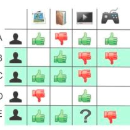Collaborative filtering is a critical technique in recommender systems. Among various methods, an increasingly popular paradigm is to reconstruct user-item interactions based on the historical observations. This can be viewed as a conditional generative task, where recently developed diffusion model demonstrates great potential. However, existing studies on diffusion models lack effective solutions for modeling implicit feedback data. Particularly, the isotropic nature of the standard diffusion process fails to account for the heterogeneous dependencies among items, leading to a misalignment with the graphical structure of the interaction space. Meanwhile, random noise destroying personalized information in interaction vectors, causing difficulty in reverse reconstruction. In this paper, we make novel adaptions of diffusion model and propose Graph Signal Diffusion Model for Collaborative Filtering (named GiffCF). To better represent the high-dimensional and sparse distribution of implicit feedback, we define a generalized form of denoising diffusion using heat equation on the item-item similarity graph. Our forward process smooths interaction signals with an advanced family of graph filters. Hence, instead of losing information, it involves item-item similarities as beneficial prior knowledge for recommendation. To reconstruct high-quality interactions, our reverse process iteratively refines and sharpens preference signals in a deterministic manner, where the update direction is conditioned on the user history and computed from a carefully designed two-stage denoiser. Finally, through extensive experiments, we show that GiffCF effectively leverages the advantages of both diffusion model and graph signal processing, and achieves state-of-the-art performance on three benchmark datasets.
翻译:暂无翻译





